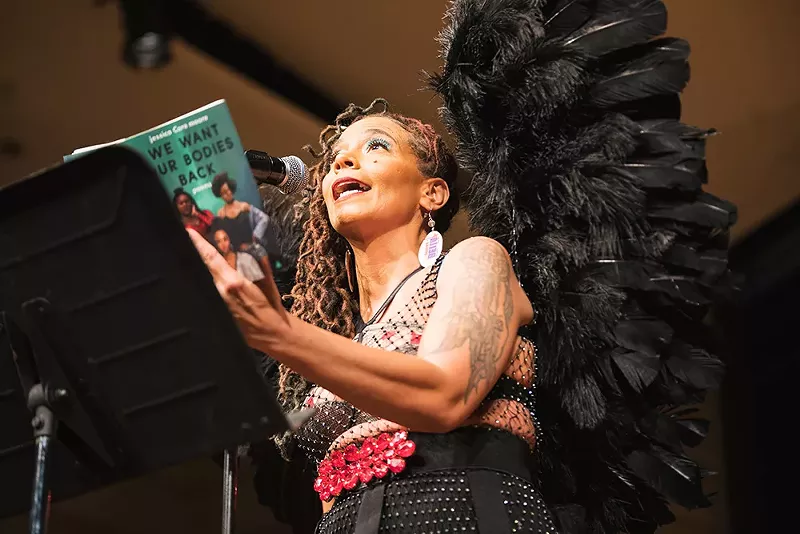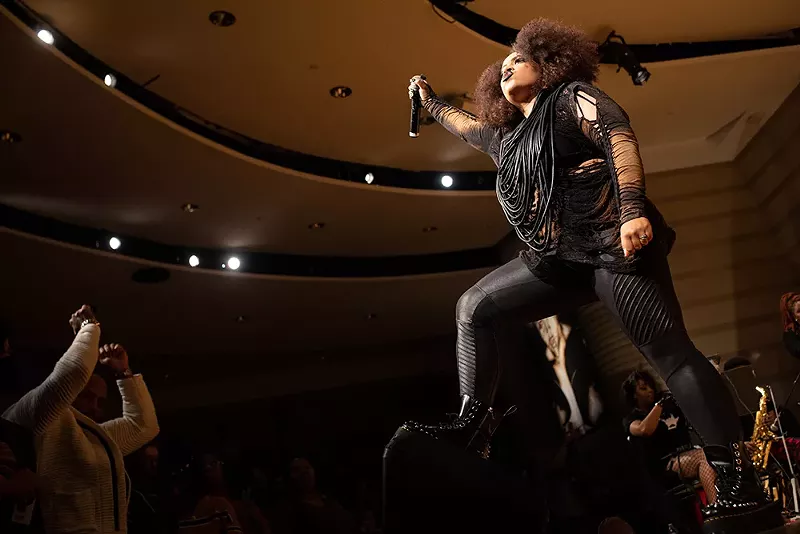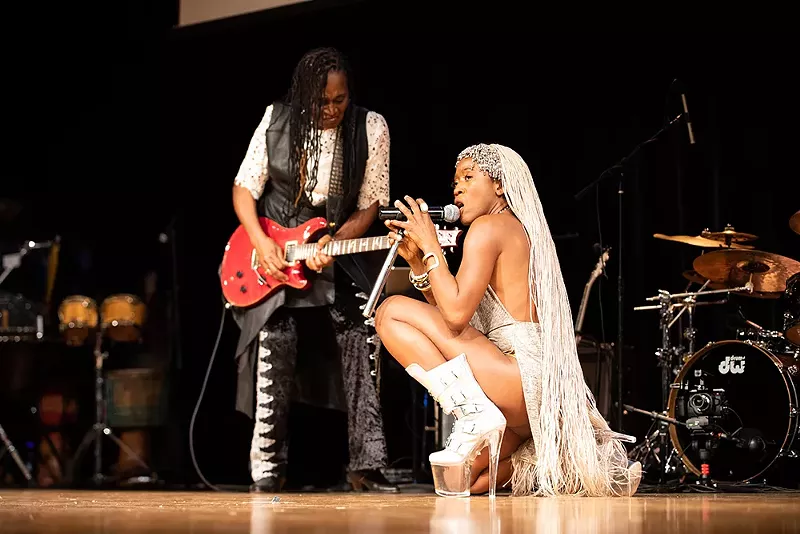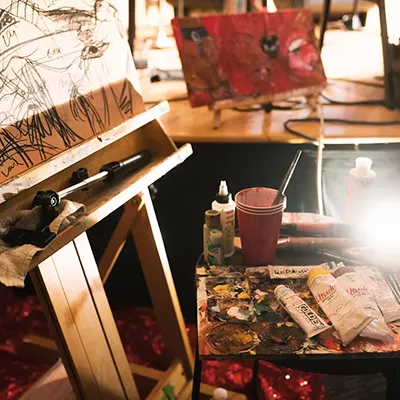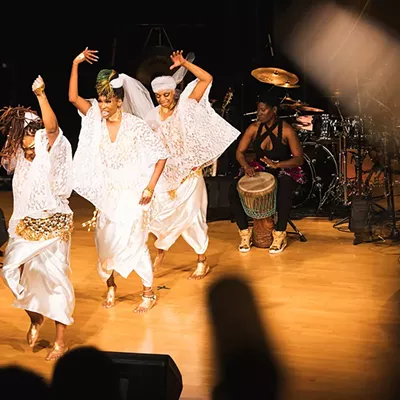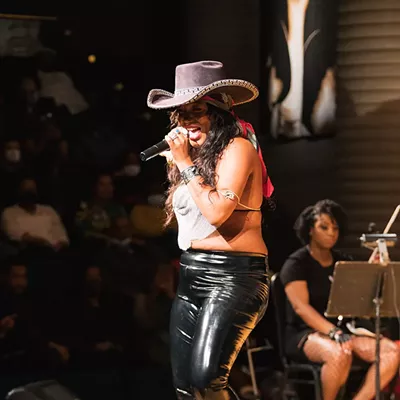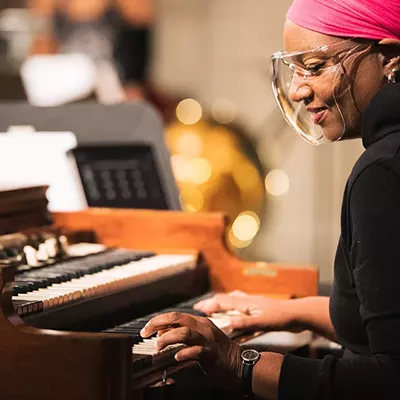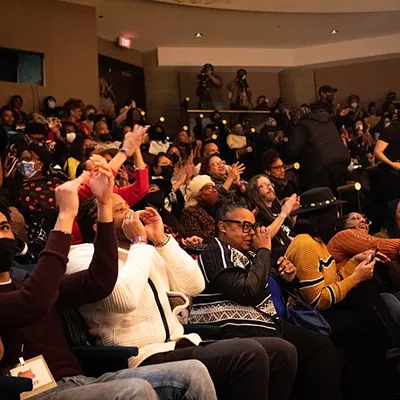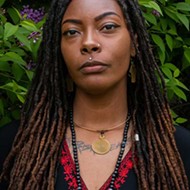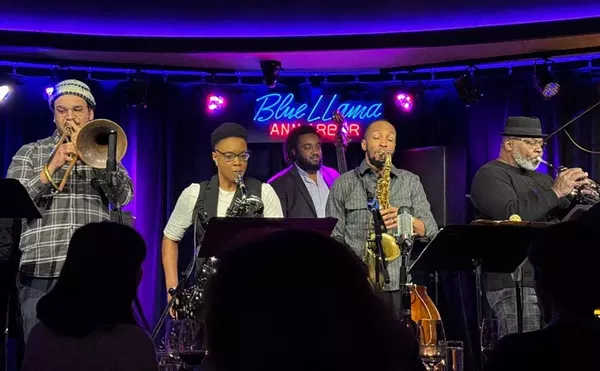jessica Care moore’s ‘Daughters of Betty’ jams to a sold-out crowd at Detroit’s Charles H. Wright
The collective formerly known as Black Women Rock is as unapologetic as ever

Audio By Carbonatix
[
{
"name": "GPT - Leaderboard - Inline - Content",
"component": "35519556",
"insertPoint": "5th",
"startingPoint": "3",
"requiredCountToDisplay": "3",
"maxInsertions": 100,
"adList": [
{
"adPreset": "LeaderboardInline"
}
]
}
]
“I hope you stay uncomfortable for the next two hours,” Detroit’s jessica Care moore says to a packed auditorium at the Charles H. Wright Museum on Saturday night.
Her voice is matter-of-fact and from the heart, as she stands on stage with feathered wings and a bedazzled hoop skirt. The Detroit poet is the founder of Daughters of Betty, formerly known as Black Women Rock, a collective of all Black, female rock ’n’ rollers.
After a two-year hiatus due to the COVID-19 pandemic, the group returned to a full house at Detroit’s Charles H. Wright Museum with a huge lineup of vocalists and musicians.
The group has officially changed its name to Daughters of Betty — Powered by Black Women Rock following the iconic Betty Davis’s death in February. Care moore started the music collective as a Davis tribute back in 2004. She tells Saturday night’s crowd with tears in her eyes it’s the first time the group is celebrating Davis as an ancestor.
Women like Davis and Care moore have always made people feel uncomfortable — as Black women who are unapologetic about their presence and create art boldly on their own terms. Daring to be yourself outside of society's preconceived notions and expectations makes others uncomfortable.
Have you ever seen a production of entirely Black women? I haven’t. In the countless metal shows I’ve gone to over the last decade, more often than not, I was the only Black person in the whole venue. So watching Black women behind the keys, drums, bass, lead guitar, and vocals, backed by a symphonic trio, was something incredible to see.
While everyone knows Beyonce, Black women like Divinity Rocks, who plays bass and sings in a rock band by the same name, rarely get as much spotlight. Divinity seduces the bass like she’s weaving a funky spell with her fingers.
Ghanian American singer YahZarah damn near swept the floor with her flowing blonde wig as her soulful ballads filled the room. She has toured doing backup vocals for Lenny Kravitz and Madonna, but rarely gets to be center stage. Canadian singer Sate belted out hard rock ragers and made the audience literally howl at the moon along with her song “Howler.”
The audience wasn’t ready for Militia Vox, who told them, “Get the fuck up! You’re not at home watching television.” The commanding powerhouse performs a combination of nü-metal and heavy metal as she sings about pain and rage, fist pumps abound. She is the real deal. This woman has toured with the godfather of heavy metal himself, Rob Halford of Judas Priest. She also fronts an all-female tribute to the heavy metal legends called Judas Priestess.
And then there was the debut of Care moore’s latest project with vocalist Steffanie Christi’an. The duo’s song “Rock and Roll Ni66a” was as unapologetic as it gets. And their final song “Jim Crow” presented a scathing critique of colorism and stereotypes perpetuated within the Black community.
The frustration and anger were tangible as they yelled “we’re Jim Crowing our Blackness, what the fuck are we doing” in a song reminiscent of Rage Against the Machine. It's an anthem for every Black person who has even been told they weren't "Black enough."
Every woman who stepped on that stage to sing, dance, rap, and more was given the space to simply just be — to be an artist, to slap a harp just like it was a bass guitar, to howl into the night, without having to conform to the label “Black woman” and the perceived image that comes along with it.
One of the most beautiful things that happened during the evening was the jam session at the end when all 14 featured vocalists got on stage together. Though they all have vastly different styles under the “rock” genre, and varying levels of experience performing, they all gave each other the chance to shine. Joi, a trailblazer in Atlanta’s funk and R&B scenes since the early 1990s, sat back and smiled as she watched up-and-coming artist Jypsy Jeyfree sing. There were no egos, no diva personalities, just artists celebrating each other.
The theme of the night was a resounding “we are tired of having to repeat ourselves.” That Black women are here in rock ’n’ roll, soul, metal, funk, and whatever other spaces we decide we want to be. That we can play heavy metal guitar solos just as well as anyone else. That our Blackness cannot be defined and confined. That if no one will celebrate Black women, we will celebrate ourselves. That Black women rock.
Stay connected with Detroit Metro Times. Subscribe to our newsletters, and follow us on Google News, Apple News, Twitter, Facebook, Instagram, Reddit, or TikTok.

